Yichang Zhang
additional authors not shown
Outcome Accuracy is Not Enough: Aligning the Reasoning Process of Reward Models
Feb 04, 2026Abstract:Generative Reward Models (GenRMs) and LLM-as-a-Judge exhibit deceptive alignment by producing correct judgments for incorrect reasons, as they are trained and evaluated to prioritize Outcome Accuracy, which undermines their ability to generalize during RLHF. We introduce Rationale Consistency, a fine-grained metric that quantifies the alignment between the model's reasoning process and human judgment. Our evaluation of frontier models reveals that rationale consistency effectively discriminates among state-of-the-art models and detects deceptive alignment, while outcome accuracy falls short in both respects. To mitigate this gap, we introduce a hybrid signal that combines rationale consistency with outcome accuracy for GenRM training. Our training method achieves state-of-the-art performance on RM-Bench (87.1%) and JudgeBench (82%), surpassing outcome-only baselines by an average of 5%. Using RM during RLHF, our method effectively improves performance as demonstrated on Arena Hard v2, notably yielding a 7% improvement in creative writing tasks. Further analysis confirms that our method escapes the deceptive alignment trap, effectively reversing the decline in rationale consistency observed in outcome-only training.
Qwen3Guard Technical Report
Oct 16, 2025Abstract:As large language models (LLMs) become more capable and widely used, ensuring the safety of their outputs is increasingly critical. Existing guardrail models, though useful in static evaluation settings, face two major limitations in real-world applications: (1) they typically output only binary "safe/unsafe" labels, which can be interpreted inconsistently across diverse safety policies, rendering them incapable of accommodating varying safety tolerances across domains; and (2) they require complete model outputs before performing safety checks, making them fundamentally incompatible with streaming LLM inference, thereby preventing timely intervention during generation and increasing exposure to harmful partial outputs. To address these challenges, we present Qwen3Guard, a series of multilingual safety guardrail models with two specialized variants: Generative Qwen3Guard, which casts safety classification as an instruction-following task to enable fine-grained tri-class judgments (safe, controversial, unsafe); and Stream Qwen3Guard, which introduces a token-level classification head for real-time safety monitoring during incremental text generation. Both variants are available in three sizes (0.6B, 4B, and 8B parameters) and support up to 119 languages and dialects, providing comprehensive, scalable, and low-latency safety moderation for global LLM deployments. Evaluated across English, Chinese, and multilingual benchmarks, Qwen3Guard achieves state-of-the-art performance in both prompt and response safety classification. All models are released under the Apache 2.0 license for public use.
RMTBench: Benchmarking LLMs Through Multi-Turn User-Centric Role-Playing
Jul 27, 2025Abstract:Recent advancements in Large Language Models (LLMs) have shown outstanding potential for role-playing applications. Evaluating these capabilities is becoming crucial yet remains challenging. Existing benchmarks mostly adopt a \textbf{character-centric} approach, simplify user-character interactions to isolated Q&A tasks, and fail to reflect real-world applications. To address this limitation, we introduce RMTBench, a comprehensive \textbf{user-centric} bilingual role-playing benchmark featuring 80 diverse characters and over 8,000 dialogue rounds. RMTBench includes custom characters with detailed backgrounds and abstract characters defined by simple traits, enabling evaluation across various user scenarios. Our benchmark constructs dialogues based on explicit user motivations rather than character descriptions, ensuring alignment with practical user applications. Furthermore, we construct an authentic multi-turn dialogue simulation mechanism. With carefully selected evaluation dimensions and LLM-based scoring, this mechanism captures the complex intention of conversations between the user and the character. By shifting focus from character background to user intention fulfillment, RMTBench bridges the gap between academic evaluation and practical deployment requirements, offering a more effective framework for assessing role-playing capabilities in LLMs. All code and datasets will be released soon.
MTR-Bench: A Comprehensive Benchmark for Multi-Turn Reasoning Evaluation
May 26, 2025Abstract:Recent advances in Large Language Models (LLMs) have shown promising results in complex reasoning tasks. However, current evaluations predominantly focus on single-turn reasoning scenarios, leaving interactive tasks largely unexplored. We attribute it to the absence of comprehensive datasets and scalable automatic evaluation protocols. To fill these gaps, we present MTR-Bench for LLMs' Multi-Turn Reasoning evaluation. Comprising 4 classes, 40 tasks, and 3600 instances, MTR-Bench covers diverse reasoning capabilities, fine-grained difficulty granularity, and necessitates multi-turn interactions with the environments. Moreover, MTR-Bench features fully-automated framework spanning both dataset constructions and model evaluations, which enables scalable assessment without human interventions. Extensive experiments reveal that even the cutting-edge reasoning models fall short of multi-turn, interactive reasoning tasks. And the further analysis upon these results brings valuable insights for future research in interactive AI systems.
Qwen3 Technical Report
May 14, 2025
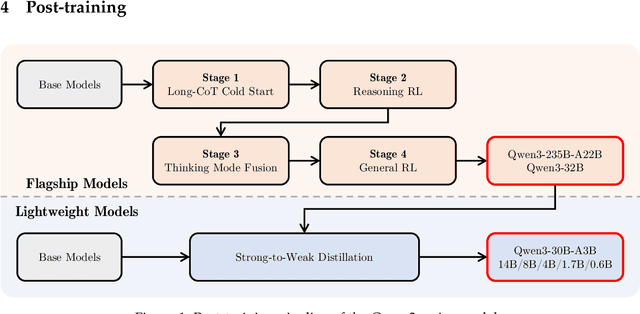

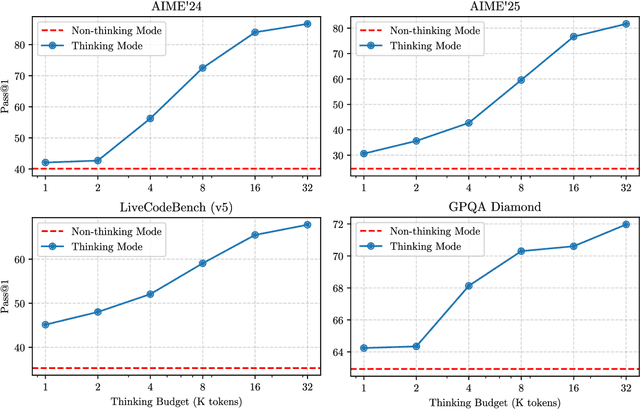
Abstract:In this work, we present Qwen3, the latest version of the Qwen model family. Qwen3 comprises a series of large language models (LLMs) designed to advance performance, efficiency, and multilingual capabilities. The Qwen3 series includes models of both dense and Mixture-of-Expert (MoE) architectures, with parameter scales ranging from 0.6 to 235 billion. A key innovation in Qwen3 is the integration of thinking mode (for complex, multi-step reasoning) and non-thinking mode (for rapid, context-driven responses) into a unified framework. This eliminates the need to switch between different models--such as chat-optimized models (e.g., GPT-4o) and dedicated reasoning models (e.g., QwQ-32B)--and enables dynamic mode switching based on user queries or chat templates. Meanwhile, Qwen3 introduces a thinking budget mechanism, allowing users to allocate computational resources adaptively during inference, thereby balancing latency and performance based on task complexity. Moreover, by leveraging the knowledge from the flagship models, we significantly reduce the computational resources required to build smaller-scale models, while ensuring their highly competitive performance. Empirical evaluations demonstrate that Qwen3 achieves state-of-the-art results across diverse benchmarks, including tasks in code generation, mathematical reasoning, agent tasks, etc., competitive against larger MoE models and proprietary models. Compared to its predecessor Qwen2.5, Qwen3 expands multilingual support from 29 to 119 languages and dialects, enhancing global accessibility through improved cross-lingual understanding and generation capabilities. To facilitate reproducibility and community-driven research and development, all Qwen3 models are publicly accessible under Apache 2.0.
PolyMath: Evaluating Mathematical Reasoning in Multilingual Contexts
Apr 30, 2025Abstract:In this paper, we introduce PolyMath, a multilingual mathematical reasoning benchmark covering 18 languages and 4 easy-to-hard difficulty levels. Our benchmark ensures difficulty comprehensiveness, language diversity, and high-quality translation, making it a highly discriminative multilingual mathematical benchmark in the era of reasoning LLMs. We conduct a comprehensive evaluation for advanced LLMs and find that even Qwen-3-235B-A22B-Thinking and Gemini-2.5-pro, achieve only 54.6 and 52.2 benchmark scores, with about 40% accuracy under the highest level From a language perspective, our benchmark reveals several key challenges of LLMs in multilingual reasoning: (1) Reasoning performance varies widely across languages for current LLMs; (2) Input-output language consistency is low in reasoning LLMs and may be correlated with performance; (3) The thinking length differs significantly by language for current LLMs. Additionally, we demonstrate that controlling the output language in the instructions has the potential to affect reasoning performance, especially for some low-resource languages, suggesting a promising direction for improving multilingual capabilities in LLMs.
HellaSwag-Pro: A Large-Scale Bilingual Benchmark for Evaluating the Robustness of LLMs in Commonsense Reasoning
Feb 17, 2025Abstract:Large language models (LLMs) have shown remarkable capabilities in commonsense reasoning; however, some variations in questions can trigger incorrect responses. Do these models truly understand commonsense knowledge, or just memorize expression patterns? To investigate this question, we present the first extensive robustness evaluation of LLMs in commonsense reasoning. We introduce HellaSwag-Pro, a large-scale bilingual benchmark consisting of 11,200 cases, by designing and compiling seven types of question variants. To construct this benchmark, we propose a two-stage method to develop Chinese HellaSwag, a finely annotated dataset comprising 12,000 instances across 56 categories. We conduct extensive experiments on 41 representative LLMs, revealing that these LLMs are far from robust in commonsense reasoning. Furthermore, this robustness varies depending on the language in which the LLM is tested. This work establishes a high-quality evaluation benchmark, with extensive experiments offering valuable insights to the community in commonsense reasoning for LLMs.
CodeElo: Benchmarking Competition-level Code Generation of LLMs with Human-comparable Elo Ratings
Jan 03, 2025Abstract:With the increasing code reasoning capabilities of existing large language models (LLMs) and breakthroughs in reasoning models like OpenAI o1 and o3, there is a growing need to develop more challenging and comprehensive benchmarks that effectively test their sophisticated competition-level coding abilities. Existing benchmarks, like LiveCodeBench and USACO, fall short due to the unavailability of private test cases, lack of support for special judges, and misaligned execution environments. To bridge this gap, we introduce CodeElo, a standardized competition-level code generation benchmark that effectively addresses all these challenges for the first time. CodeElo benchmark is mainly based on the official CodeForces platform and tries to align with the platform as much as possible. We compile the recent six months of contest problems on CodeForces with detailed information such as contest divisions, problem difficulty ratings, and problem algorithm tags. We introduce a unique judging method in which problems are submitted directly to the platform and develop a reliable Elo rating calculation system that aligns with the platform and is comparable with human participants but has lower variance. By testing on our CodeElo, we provide the Elo ratings of 30 existing popular open-source and 3 proprietary LLMs for the first time. The results show that o1-mini and QwQ-32B-Preview stand out significantly, achieving Elo ratings of 1578 and 1261, respectively, while other models struggle even with the easiest problems, placing in the lowest 25 percent among all human participants. Detailed analysis experiments are also conducted to provide insights into performance across algorithms and comparisons between using C++ and Python, which can suggest directions for future studies.
Confidence v.s. Critique: A Decomposition of Self-Correction Capability for LLMs
Dec 27, 2024
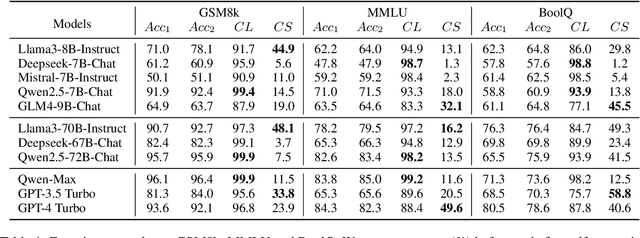
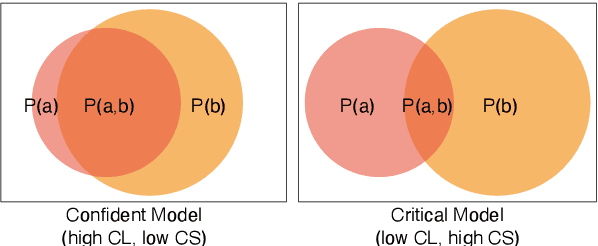

Abstract:Large Language Models (LLMs) can correct their self-generated responses, but a decline in accuracy after self-correction is also witnessed. To have a deeper understanding of self-correction, we endeavor to decompose, evaluate, and analyze the self-correction behaviors of LLMs. By enumerating and analyzing answer correctness before and after self-correction, we decompose the self-correction capability into confidence (being confident to correct answers) and critique (turning wrong answers to correct) capabilities, and propose two metrics from a probabilistic perspective to measure these 2 capabilities, along with another metric for overall self-correction capability evaluation. Based on our decomposition and evaluation metrics, we conduct extensive experiments and draw some empirical conclusions. For example, we find different models can exhibit distinct behaviors: some models are confident while others are more critical. We also find the trade-off between the two capabilities (i.e. improving one can lead to a decline in the other) when manipulating model self-correction behavior by prompts or in-context learning. Further, we find a simple yet efficient strategy to improve self-correction capability by transforming Supervision Fine-Tuning (SFT) data format, and our strategy outperforms vanilla SFT in both capabilities and achieves much higher accuracy after self-correction. Our code will be publicly available on GitHub.
Qwen2.5 Technical Report
Dec 19, 2024

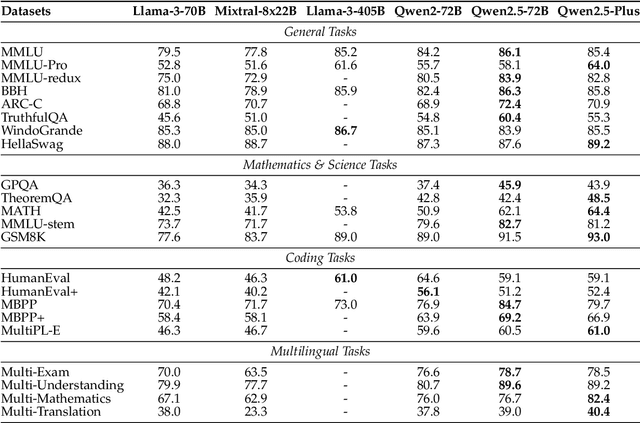
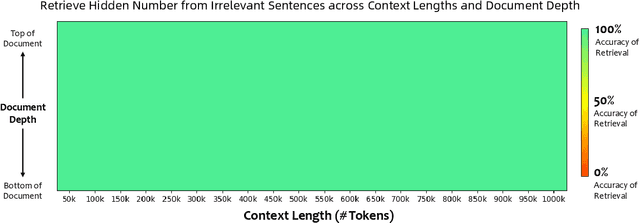
Abstract:In this report, we introduce Qwen2.5, a comprehensive series of large language models (LLMs) designed to meet diverse needs. Compared to previous iterations, Qwen 2.5 has been significantly improved during both the pre-training and post-training stages. In terms of pre-training, we have scaled the high-quality pre-training datasets from the previous 7 trillion tokens to 18 trillion tokens. This provides a strong foundation for common sense, expert knowledge, and reasoning capabilities. In terms of post-training, we implement intricate supervised finetuning with over 1 million samples, as well as multistage reinforcement learning. Post-training techniques enhance human preference, and notably improve long text generation, structural data analysis, and instruction following. To handle diverse and varied use cases effectively, we present Qwen2.5 LLM series in rich sizes. Open-weight offerings include base and instruction-tuned models, with quantized versions available. In addition, for hosted solutions, the proprietary models currently include two mixture-of-experts (MoE) variants: Qwen2.5-Turbo and Qwen2.5-Plus, both available from Alibaba Cloud Model Studio. Qwen2.5 has demonstrated top-tier performance on a wide range of benchmarks evaluating language understanding, reasoning, mathematics, coding, human preference alignment, etc. Specifically, the open-weight flagship Qwen2.5-72B-Instruct outperforms a number of open and proprietary models and demonstrates competitive performance to the state-of-the-art open-weight model, Llama-3-405B-Instruct, which is around 5 times larger. Qwen2.5-Turbo and Qwen2.5-Plus offer superior cost-effectiveness while performing competitively against GPT-4o-mini and GPT-4o respectively. Additionally, as the foundation, Qwen2.5 models have been instrumental in training specialized models such as Qwen2.5-Math, Qwen2.5-Coder, QwQ, and multimodal models.
 Add to Chrome
Add to Chrome Add to Firefox
Add to Firefox Add to Edge
Add to Edge